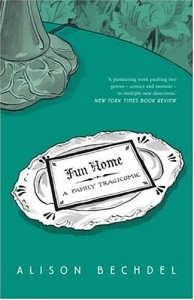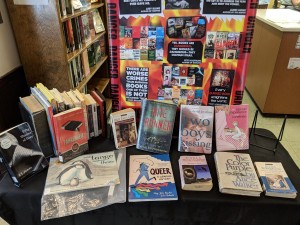 This time of year it seems that everyone is asking readers to look deep in their hearts and wallets and consider making tax-deductible donations. It can become numbing to hear these pleas repetitively and not to hear about why these donations are crucial to protecting important freedoms in the year to come. So as a reminder as to what we are all fighting for, here are two victories that would not have been possible without the generous support of CBLDF’s members and followers. Thanks to vital donations made in 2017, CBLDF was able to mobilize quickly and protect everyone’s freedom to read in 2018. Two crucial victories both came following attacks on LGBTQ literature.
This time of year it seems that everyone is asking readers to look deep in their hearts and wallets and consider making tax-deductible donations. It can become numbing to hear these pleas repetitively and not to hear about why these donations are crucial to protecting important freedoms in the year to come. So as a reminder as to what we are all fighting for, here are two victories that would not have been possible without the generous support of CBLDF’s members and followers. Thanks to vital donations made in 2017, CBLDF was able to mobilize quickly and protect everyone’s freedom to read in 2018. Two crucial victories both came following attacks on LGBTQ literature.
The first attack arrived in New Jersey, when two parents decided that the award-winning graphic novel Fun Home was unacceptable due to “the sexually explicit nature.” The book was assigned to various senior English sections this past spring, and one of the parents, Steve DiSturco, wanted it removed from the curriculum before his child became a senior in the fall.
DiSturco added, “We also don’t want children to be singled out, we feel that would not be in the best interest for children or the community,” referring to the “opt-out” policy. The high school’s “opt-out” policy was already in place for situations like these. Any student uncomfortable with an assigned text was allowed and encouraged to choose to read an alternative assignment. But to DiSturco and Mark Bisci, the two parents who voiced complaints about Fun Home, the policy wasn’t sufficient. and they don’t want children singled out for not participating. The sensitivity they expressed to the isolation hypothetical students might experience reading a different text in class was tone-deaf to the isolation of real students who couldn’t find themselves represented in the curriculum.
In an email to New Jersey’s Echoes~Sentinel, Superintendent Elizabeth Jewett said that while she understood the concerns both parents had, the work was chosen with careful consideration. “The curriculum was expanded to include a broad range of literature to reach all students, not just works that portray traditional gender and sexual identities. The expansion of the English curriculum is in alignment with the strategic plan and is the result of a two-year research process which included professional development for the English department staff.”
Jewett said decisions about curriculum took into account multiple perspectives. The changes were inspired by messages solicited by Jewett from graduating students about their experiences throughout high school, and how things could be improved. After some students complained that the curriculum didn’t reflect the full spectrum of gender and sexual identities, Jewett took that feedback to heart.
“They said they felt marginalized because we were not more inclusive. So I just want you to understand that’s something that really resonated with me and really concerned me. I did not want students to graduate from our school having had an experience where they didn’t feel included in our school community.”
Back in May, Comic Book Legal Defense Fund in collaboration with National Coalition Against Censorship as part of the Kids Right to Read Project, sent a letter to Superintendent Jewett in support of the inclusion of Fun Home in the curriculum.
Graphic novels combine visual art with literary and cinematic techniques for educationally rich storytelling. Alison Bechdel’s Fun Home is an essential text that has been recognized with significant literary awards. The book has been heralded within the literary and arts community as “a pioneering work” in the comics and memoir genres. (New York Times Sunday Book Review). The inspirational novel chronicles Bechdel’s real-life struggles of sexual identity, emotional abuse and domestic strife while growing up in rural Pennsylvania with a closeted gay father. Bechdel’s memoir is resonant with many youth experiences and offers teen readers a safe place to examine questions related to personal identity, family relationships, and the need to face the truth in their own lives.
The full letter and as well as the CBLDF Discussion Guide that was included in the email to the Superintendent can be read here.
CBLDF was among the first to respond in support for the library, alongside National Coalition Against Censorship and the American Library Association’s Office for Intellectual Freedom. Thanks to the far reaching support of CBLDF followers who shared the story and the stalwart and outspoken locals who attended the library meeting and fought for the freedom to display books that cover the interests and stories of many different voices, the challenge was shot down and the display stayed standing. “The freedom to read is expanded when citizens have the right to make up their own minds,” said CBLDF Executive Director Charles Brownstein about the decision, adding “We commend the board of the Rumford library for respecting their citizens and upholding their rights.”
If you want to help with victories like these in 2019, consider making a donation today. Your generous support helps CBLDF extend advice and resources when comics are challenged all over the country, as well as develop new ways to fight for freedom of expression every day. Whether you become a card-carrying member of CBLDF or snag free speech merch in our Reward Zone, every dollar donated to CBLDF helps further the fight for free speech in the coming year.
